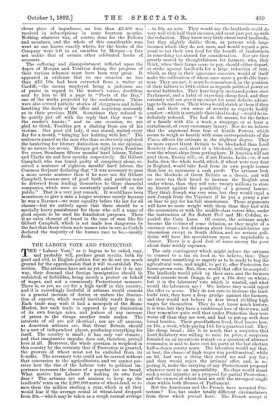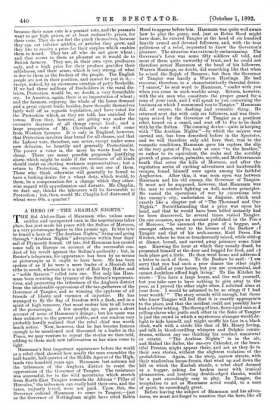THE LABOUR VOTE AND PROTECTION.
THE " Labour Vote," as it begins to be called, may, and probably will, produce great results, both for good and evil, in English politics, but we do not see much ground for the apprehension that it will re-establish Pro- tection. The artisans have not as yet asked for it in any way, their demand that foreign immigration should be restricted, or forbidden, being merely a protest on behalf of wages, and not a consciously Protectionist measure. There is, as yet, no cry for a high tariff in this country, and it is exceedingly doubtful if artisans would consent to a general increase of duties, or endure the diminu- tion of exports, which would inevitably result from it. Each trade may wish it had a monopoly of the Home Market, but each trade is opposed to any diminution of its own foreign sales, and jealous of any increase of prices in the things another trade makes. The interests of all are not identical ; nor are all anxious, as American artisans are, that Great Britain should be a sort of independent planet, producing everything for itself. The country is small ; it has only one climate ; and that imaginative impulse does not, therefore, prevail here at all. Moreover, the whole question is weighted in this country by the certainty that if Protection is granted, the growers of wheat must not be excluded from its b?nefits. The necessary vote could not be carried without that concession to the agriculturists, and we cannot per- ceive how the rise of the Labour vote to political im- portance increases the chance of a popular tax on bread. What motive has Labour for making its own food dear ? The artisans are not anxious to keep up the landlords' rents on the 2,200,000 acres of wheat-land, or to save them the million sterling a year, which is all they would lose if the average rental of wheat-land dropped from 20s.—which may be taken as a rough normal average —to 10s. an acre. They would say the landlords could do very well with half their incomes, and must just put up with the reduction. They know very little about rural landlords, but they slightly dislike them, as persons with large incomes which they do not earn, and would regard a pro- posal to tax their own food for the benefit of landowners as something too absurd for consideration. Nor are they greatly moved by thoughtfulness for farmers, who, they think, when their farms cease to pay, should either depart, or strike against landlords for a large reduction of rent, which, as they in their ignorance conceive, would of itself make the cultivation of wheat once more a profitable busi- ness. They are not, it must be remembered, in the position of their fathers in 1844, either as regards political power or mental habitudes. They have largely increased power over Parliament, and a habit of expecting cheap food, and they certainly will not give it up except for some definite advan- tage to themselves. Their wives would shriek at them if they did, and their own sense of security as regards bodily comfort—which is certainly their ideal to-day--would be in- definitely reduced. The loaf at 9d. means, for the father of a family with 25s. a week, a stoppage, or at least a curtailment, of every customary luxury. Nor do we believe that the argument from fear of hostile Powers, which seems to weigh so heavily with some correspondents of the Times, affects the artisans in the slightest degree. They no more expect Great Britain to be blockaded than Lord Rosebery does, and, short of a blockade, nothing can pre- vent the wheat-ships from getting here. If America will not send them, Russia will ; or, if not Russia, India ; or, if not India, then the whole world, which, if wheat were very dear in England, would take food from its own people sooner than lose so enormous a cash profit. The artisans look on the blockade of Great Britain as a dream, and will no more tax their bread to increase the English area under wheat, than they will vote twenty millions to store up biscuit against the possibility of a general famine.. They think Joseph was very wise, but they would expel a new Joseph from the Vizierate if he put a penny a pint on beer to pay for his full storehouses. Those arguments will have no more weight with them than they had with I the economists or with the middle-class voters who, under the instruction of Sir Robert Peel and Mr. Cobden, re- pealed the Corn Laws. Of course, the artisans might become the victims of some delusion, as they might of a currency craze ; but delusions about bread-and-butter are uncommon except in South Africa, and no serious poli- tician will base his speculations upon so improbable a chance. There is a good deal of sense among the poor about their weekly expenses.
The only contingency which might induce the artisans to consent to a tax on food is, we believe, this : They might want something so eagerly as to be ready to buy the agricultural vote, and might, to get it, offer Protection for home-grown corn. But, then, would that offer be accepted ? The landlords would prick up their ears, and the farmers would concede most things, to get a 10s. duty on wheat ; but it is the labourers' vote which is wanted, and what would the labourers say ? We believe they would reject the offer en masse. They do not care to increase the land- lords' rent, they have a deep grudge against the farmers, and they would not believe in dear bread yielding high wages for themselves. They do not know much history, it is true, but they have a traditional lore of their own, and they remember quite well that under Protection they were worse off than they are now, and had to put up with dear bread besides. Their grandfathers lived, God knows how, on 10s. a week, while paying 14d. for a quartern loaf. They like cheap bread ; like it so much, that a suspicion that Lord Salisbury was willing to raise its price, a suspicion founded on an incautious remark on a question of abstract economics, is said to have cost his party at the last election half-a-dozen county seats. The labourers would say that, at best, the chance of high wages was problematical, while an 8d. loaf was a thing they could see and pay for ; and they would reject the artisans' offer, and, in re- jecting it, make the carrying of any Protectionist proposal whatever next to an impossibility. No class would stand such a social injustice as a proposal for partial Protection; and the owners of wheat-land are still the strongest single class within both Houses of Parliament.
But the Americans and the French have accepted Pro- tection ? Yes, but under totally different circumstances from those which prevail here. The French accept it because their mass vote is a peasant vote, and the peasants want to get high prices, or at least endurable prices, for their corn. They do not feel the pinch themselves, because they can eat inferior articles, or articles they grow, and they like to receive a price for their surplus which enables them to hoard. They tax all who do not grow wheat ; and that seems to them as pleasant as it would do to British farmers. They are, in their own eyes, producers only, and a high price for their produce gratifies their selfishness, and their sense, which is very strong, of what is due to them as the feeders of the people. The English people are not in their position, and cannot be put in it,— except, indeed, by an enormous creation of petty freeholds. If we had three millions of freeholders in the rural dis- tricts, Protection would be, no doubt, a very formidable cry. In America, again, there is no importation of wheat ; and the farmers, enjoying the whole of the home demand and a great export trade besides, have thought themselves fairly well off as regards legislation, and have voted for the Protection which, as they are told, has enriched the towns. Even they, however, are giving way under the excessive dearness of all things except food; and a large proportion of Mr. Cleveland's vote will come from Western farmers. It is only in England, however, that Protection involves dear bread for all classes, and that the Labour vote, therefore, can never, except under some new delusion, be heartily and generally Protectionist. The poorer a voter is, the more he wants food to be cheap. There are many possible proposals justifying alarm which might be made if the workmen of all kinds should insist on electing workmen representatives ; but a return to Protection, we conceive, is not one of them. Those who think otherwise will generally be found to have a lurking desire for a wheat duty, which would, to them, be a compensation for a change which they other- wise regard with apprehension and distaste. Mr. Chaplin, we dare say, thinks the labourers will be favourable to Protection ; but, then, would Mr. Chaplin feel distressed if wheat were 60s. a quarter ?



































 Previous page
Previous page